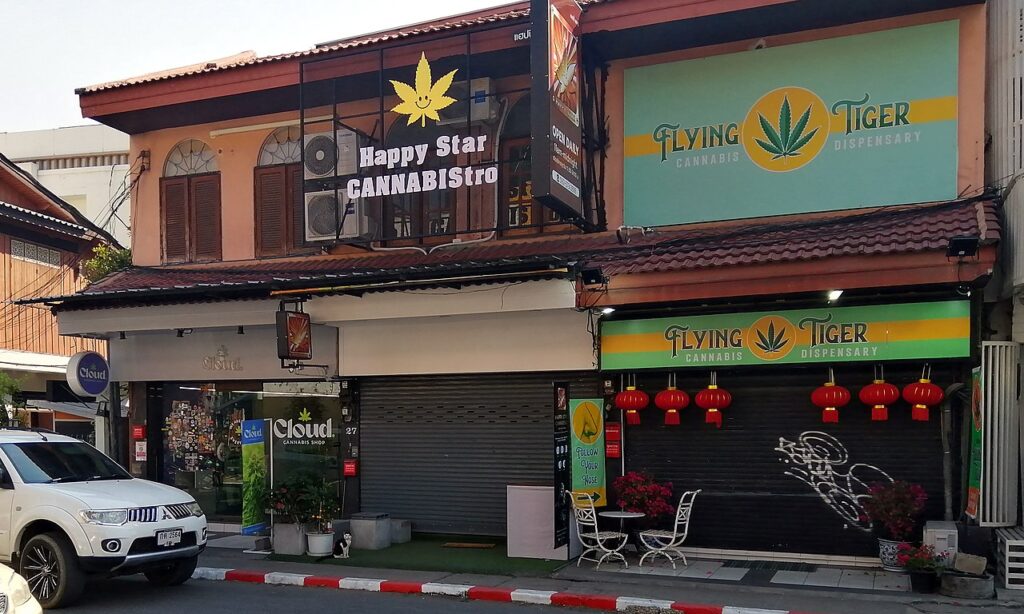Thailand’s new Prime Minister is seeking to more strictly regulate cannabis, aiming to limit its use to medicinal purposes. This has alarmed the burgeoning industry which, since decriminalization last year, has seen rapid growth, with over 6,000 stores nationwide and potential value predictions of $1.25 billion by 2025. Experts predict regulations could force over 65% of suppliers out of business.
Thailand: Cannabis Sellers Concerned About Regulation


The new Prime Minister of Thailand has indicated that his government will seek stricter regulation of cannabis sales. Suppliers in the country fear for the future of their businesses.
For more news like this, download our free cannabis news app.
Uncertain Future for the Industry in Thailand
The Thai cannabis industry is in limbo. The government of Prime Minister Srettha Thavisin intends to regulate the sale of the plant again, limiting it only for medicinal use, a move that alarms the industry.
Thailand was the first country in Southeast Asia to decriminalize cannabis last year. Since then, over a million people have registered to grow cannabis, and almost 6,000 stores selling this psychoactive plant have opened nationwide. Over 1,200 of these are located in Bangkok.
Thai Sellers Speak Up
May Kamkrad opened her Fat Buds Weed Shop in the Ekkamai district of Bangkok shortly after decriminalization in Thailand.
She says her customers are both Thai locals and foreigners, and the business has changed her life: “I had to borrow money to open. Cannabis has given me a job and taught me how to make money. I used to work in a restaurant, but now I earn more. My family’s and our lives have improved. Since I earn more, I can support my family,” she explained.
The store’s warm and creative decoration reflects its humble beginnings: “We didn’t invest much money in this. We had the table and the air conditioner, that’s all. Everything else has been added over time. For us, it’s not just about making good money but about thinking long-term, earning the Thai community’s trust, and trying to do the right thing,” affirms Ricky, who co-manages the store with May.
Exponential Growth of the Thai Cannabis Industry
Fat Buds is unlike the new flashy providers in Thong Lo, Bangkok’s nightlife area. There, many of the stores that opened after decriminalization in Thailand operate in renovated buildings with clean counters, bright lights, and higher prices. They resemble medical centers.
The Thai Chamber of Commerce estimated that the cannabis sector could reach a value of $1.25 billion by 2025. However, according to Kitty Chopaka, activist and owner of the Chopaka store in Bangkok, any restriction will impact sellers.
“I support over 50 farms in my store, and a farm usually supports at least one to five families,” she said. She believes the public should have responsible access to cannabis, as the industry has shown it can abide by the rules.
Gloria Lai, Regional Director for Asia of the International Consortium on Drug Policies, is concerned about the enforcement of the new regulation in Thailand, saying “the industry has grown immensely. Whatever new regulation is adopted will affect a wide range of people,” she explained.
Anticipating Industry Changes
However, Carl Linn, co-founder of Cannabox Thailand, a cannabis delivery service, believes recreational consumption is here to stay: “I think what will happen is, once this all gets sorted out, we’ll have a new version of what medicinal cannabis is,” he said.
“I believe there will be regulations designed to create an environment where only medicinal cannabis can be grown and sold. The goal isn’t the grand idea of an all-or-nothing approach to cannabis. I think cannabis will be available to those who want to consume it in Thailand,” he emphasizes.
However, he predicts a significant shift: “They will require all suppliers to present certificates of analysis. It’s an expense that will close many dispensaries that can’t opt for a new license. I think over 65% of Thai suppliers will disappear, so the landscape will be very different.”
—
(Featured image by FredTC (CC BY-SA 4.0) via Wikimedia Commons)
DISCLAIMER: This article was written by a third-party contributor and does not reflect the opinion of Hemp.im, its management, staff, or its associates. Please review our disclaimer for more information.
This article may include forward-looking statements. These forward-looking statements generally are identified by the words “believe,” “project,” “estimate,” “become,” “plan,” “will,” and similar expressions. These forward-looking statements involve known and unknown risks as well as uncertainties, including those discussed in the following cautionary statements and elsewhere in this article and on this site. Although the company may believe that its expectations are based on reasonable assumptions, the actual results that the company may achieve may differ materially from any forward-looking statements, which reflect the opinions of the management of the company only as of the date hereof. Additionally, please make sure to read these important disclosures.
First published in DW, a third-party contributor translated and adapted the article from the original. In case of discrepancy, the original will prevail.
Although we made reasonable efforts to provide accurate translations, some parts may be incorrect. Hemp.im assumes no responsibility for errors, omissions or ambiguities in the translations provided on this website. Any person or entity relying on translated content does so at their own risk. Hemp.im is not responsible for losses caused by such reliance on the accuracy or reliability of translated information. If you wish to report an error or inaccuracy in the translation, we encourage you to contact us.



Comments are closed for this post.